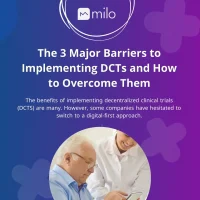In this article, we share what we have found to be the three major barriers to implementing DCTs and our suggestions to overcome them. By partnering with a CRO that has proven experience in working with digital health technologies, medical device and drugs manufacturers can count on a team of experts to benefit from decentralized trials from the beginning of the trial. First, we will briefly introduce the concept of decentralized clinical trials and the advantages of their implementation.
What are DCTs?
As the name indicates, decentralized clinical trials are studies that do not rely on a single trial centre to conduct its activities. Instead, they use digital health technologies to enable several remote tasks, allowing patients to participate from locations other than the main research base.
A DCT may have activities being conducted at the patient’s home, their local health centre or at a laboratory close to them. Wearable devices such as blood pressure monitors and teleconsultation are some common technologies enabling decentralized trials.
The Benefits of Digital Health Technologies in Clinical Trials
The benefits of implementing DCTs are many, and we have explored this subject with more depth in some of our other articles. We believe that preferring this approach over traditional trials is beneficial mainly because:
- It reduces the burden on patients, who do not need to travel to the study site to sign consent forms and report symptoms, for example
- It accelerates data collection and analysing with specialized software, decreasing the time to reach market clearance
- It increases data security with robust digital data management systems, avoiding the risks related to physical data storage and handling

#1 Risk Aversion
The first barrier we would like to discuss is not particular to DCTs. In fact, it is common that people do not trust something new because they fear the risks of leaving something traditional, tested and trusted. This is also the case with traditional and non-traditional clinical trials.
Some researchers and sponsors fear, for example, that implementing a DCT will complicate regulatory approval, as regulatory agencies still do not have many specific guidelines regarding digital health. Another common reason for hesitation is the fear of increased costs to purchase digital equipment and the need for extra training for staff.
To overcome the risk aversion barrier, knowledge acquisition and awareness raising are the best first steps. This means ensuring that the people responsible for the trial are well informed of the benefits of implementing a DCT, and with this knowledge comes the awareness that the regulatory approval process does not need to be more complicated. Partnering with a CRO will also help you to navigate regulatory requirements with confidence, reduce costs and facilitate the preparation of the personnel who will be working in the trial.
#2 Lack of Early Planning
This is a self-imposed barrier for companies of all sizes and ages that, to the contrary of the ones who hesitate because of risk aversion, trust the process completely and erroneously believe that it does not require a different kind of planning. Regulatory guidelines might still be the same, but the team must be prepared for processes that are different from traditional trial ones.
The lack of early and specific planning creates a barrier to DCT implementation because the results may not be what the sponsor was expecting, since an unprepared team will struggle to make the most of the digital health technologies they are not used with. Processes that should be done more quickly with digitalization can actually take more time if users are still figuring out how to fit them in their usual workflow.
Our recommendation to overcome this barrier is to start planning the trial earlier than usual, if it is the first time your company is conducting a DCT. The team will have time to familiarize with the new tools and software being used, and ask for guidance and training if needed. Partnering with a CRO with experience in DCTs is the easiest way to overcome this barrier, since the CRO team is already prepared to work with digital health technologies.
#3 Not Reaching Diverse Populations
This is a barrier that is more complex to understand, since “reaching diverse populations” is often cited as a benefit of DCTs, and not a barrier. However, we understand the concern of sponsors who fear that not all patient groups will adapt to digital health technologies or even have the means to access it. This would indeed hinder the diversity of the clinical trial.
The research team might avoid implementing a DCT if they think that at least part of the participants would not feel comfortable signing an eConsent form, for example, or talking to a doctor via video calls. The preoccupation that stable internet connection might not be available to everyone, reducing diversity of participant’s pool, may also create a barrier to implementing decentralized trials.
Our suggestion to overcome this barrier is to consider hybrid trials. A clinical trial does not need to be fully remote if there is the concern that this approach might alienate participants. The two worlds can coexist in the same trial: on-site and in-person activities combined with remote monitoring made available for those who feel they could benefit from it.
Summary
- Decentralized clinical trials are studies that do not rely on a single trial centre to conduct its activities
- Some of the benefits of implementing DCTs are to reduce the burden on patients, accelerate data collection and analysing and increase data security with robust digital data management systems
- It is common that people do not trust something new because they fear the risks of leaving something traditional, tested and trusted, and this is also the case with DCTs and traditional clinical trials
- To overcome the risk aversion barrier, knowledge acquisition and awareness raising are the best first step
- The lack of early and specific planning creates a barrier to DCT implementation because results may not be what the sponsor was expecting
- Our recommendation to overcome this barrier is to start planning the trial earlier than usual, if it is the first time your company is conducting a DCT
- Sponsors may fear that not all patient groups will adapt to digital health technologies or even have the means to access it
- Our suggestion to overcome this barrier is to consider hybrid trials







